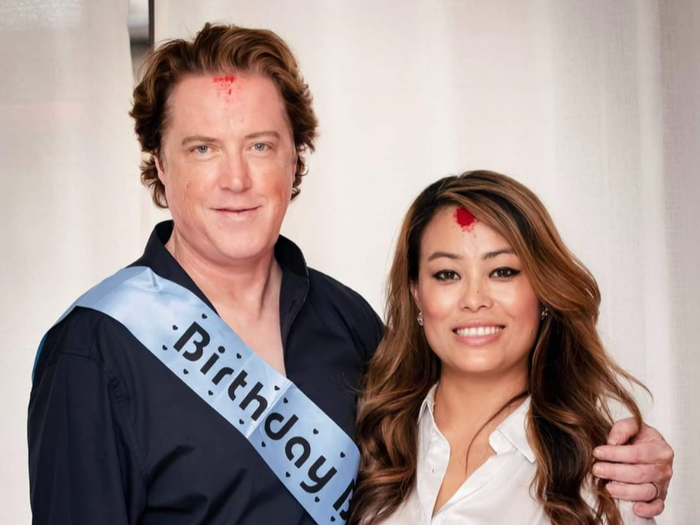A New Yorker who feared rising costs would hurt his retirement moved to Nepal. He says life is much cheaper and more relaxing.
6 min readA New Yorker who feared rising costs would hurt his retirement moved to Nepal. He says life is much cheaper and more relaxing.

Albert Greenwood
- Albert Greenwood and his wife moved to Nepal for a more affordable retirement in 2023.
- He feared high US retirement costs and wanted to be near his wife’s family.
- Nepal offers lower living costs, robust healthcare, and a supportive community, he said.
Albert Greenwood, 56, worked high-paying jobs throughout his career but feared rising costs would make his retirement in the US less than optimal.
Like many Americans seeking a cheaper place to retire, Greenwood decided to look abroad. But he moved to a country with fewer expats than many of its neighbors: Nepal.
His wife grew up in Kathmandu, and they decided to move to be closer to her family and for their money to go further. Greenwood said that between his savings and retirement income, life since moving in 2023 had been less stressful and more enjoyable. Still, he said he wasn’t sure his retirement abroad would have been so smooth if he didn’t have a prior connection to the country.
We want to hear from you. Are you an older American who has moved to a new country or state for retirement? Please fill out this quick form.
“We live nicely in a way that I would have to have much more to live like this in the US,” Greenwood said. “But I know not everybody has success with these moves. If you have a big family, you miss them, and maybe that’s going to be a problem.”
Greenwood is one of dozens of Americans who talked to Business Insider about retiring abroad, fearing retirement costs in the US. Many Americans aren’t fully prepared for retirement, and many who have retired say their savings are often not enough.
Retirement fears in the US
Greenwood was raised in Philadelphia and spent his college years in upstate New York and Boston. He secured his MBA and worked in a variety of brand-management and business-development roles, earning six figures a few years into his career. He then became the head of sales for a manufacturer of Asian-inspired foods in the New York City area. Ten years ago, he married his wife, a flight attendant turned hair colorist.
He retired at 55 after living beneath his means and getting a small portion of his company’s sale to a private-equity firm. Greenwood said he knew he could retire “comfortably enough” in the US, but he worried about rising healthcare costs even with company health insurance as one of his retirement benefits, which he said wasn’t the greatest. He also grew tired of the grind, New York’s winters, and the country’s polarized political climate.
He and his wife, 39, wanted to have a child through in vitro fertilization, but costs were estimated at $60,000. Rising housing costs also pressured him to consider other options; he said he paid $3,500 a month “for a box” in Westchester County, north of New York City.
“Between rent and everything else, how much are you able to save even on a good salary?” Greenwood said, adding that he found New York’s social climate increasingly aggressive. “I may have been able to fly by in retirement, but at what level?”
Albert Greenwood
He and his wife hoped to move to Nepal after his retirement, and after a few years of financial planning, they moved on May 1, 2023. Greenwood had sold his co-op a year before moving and tried to tie up loose ends well in advance — including figuring out how to transport his cats to Nepal.
“The process has been a lot better than I thought it would be, but you’ve got to prepare and really try to think of everything,” Greenwood said, adding that he used a VPN to get everything set up, including bank accounts for wiring money. “It makes it easier when all your credit and debit cards work.”
Retiring in Nepal with a lower cost of living
They briefly stayed at a rental place near the king’s palace while finalizing his long-term visa, which he got through his wife. They found a four-bedroom home with a garden in one of the city’s wealthier districts for about $1,150 monthly. Greenwood said the land is expensive — the home he rents he estimates could sell for $850,000 — but rents are surprisingly low.
Compared with what he paid in the US, he said, food costs are about half, while medications are often a third of the cost. He and his wife spend $35 monthly on electricity, which he said had been consistent except during rough storms. His cellphone plan is about $7 monthly, and he pays $22 every six months for garbage disposal.
Greenwood earns about $3,000 monthly from investments and has an IRA he can access once he’s 59 ½.
He said he’d embraced travel in his retirement, including to Thailand, Japan, and Singapore. He’s adopted routines including long walks, writing, and community engagement.
Albert Greenwood
Greenwood said Nepal is cheaper and safer for raising children than the US. He said IVF treatment costs about $3,000, and child healthcare is robust in Kathmandu. His wife has many family members nearby who could help care for their child and have guided them on living comfortably.
Healthcare costs are also much lower, and he said the quality of care he’d received had been high and specialized, though he added that some of the public hospitals were hit or miss.
Greenwood said Kathmandu’s infrastructure is more robust than most of the country. Hundreds died in earthquakes and flooding across the country in 2024, including more than 300 deaths during monsoon season.
Still, he said the roads in the capital are mostly safe, and many buildings are robust enough to survive most natural disasters. Temperatures rarely drop below 40 degrees Fahrenheit and are frequently in the 80s during the spring and summer, though there’s often smog in the winter months.
Growing accustomed to life in Kathmandu
Greenwood said he’d found many Kathmandu residents very tolerant of different religious and personal beliefs, adding that many Bangladeshi residents had recently moved to the city. Nepal has many festivals and public holidays that unite the community, he said, and life is slower and more relaxed in Nepal than in the US.
“Things take longer here, but that being said, if I have a problem with my door or the shower isn’t working, the repair guy is here in 20 minutes,” Greenwood said.
He’s found that nearly everyone speaks English in his part of Kathmandu, though he’s studying Nepali to better communicate with locals. He said his two nephews learned English as their first language. While many value education in Kathmandu, he said, there’s a lack of job opportunities for younger people.
Greenwood said he’d worked with a lawyer to extend his visa for the immediate future, believing Nepal’s healthcare infrastructure would fit his long-term needs.
“The setup matters a lot. I was set up with my wife, who was raised here with a big family, and they’re very much together, which has really helped me,” Greenwood said. “But I imagine if I couldn’t speak Nepali, it would be very difficult for me to really handle it.”
We want to hear from you. Are you an older American who has moved to a new country or state because of retirement fears? Please fill out this quick form or email this reporter at nsheidlower@businessinsider.com.



